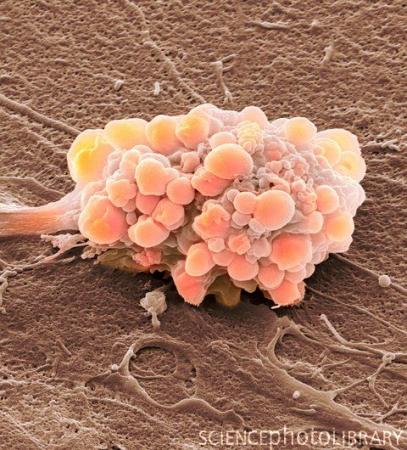
当肿瘤细胞变得耐缺氧时,会使得临床化疗和放疗难以清除。(图)
美国宾夕法尼亚州医学院的科学家发现,一些通常临床化疗无效的肿瘤细胞,通过抑制它们其中两种酶的活性,可以有效杀死它们。
美国癌症研究所的Wafik S. El-Deiry教授说道:“在过去十年,众所周知的是当肿瘤变得耐缺氧时,它们会对化疗和放疗产生抗性。这对于临床治疗来说一直是一个很大的难题,因为当肿瘤扩散时,它会有部分的区域由于缺少血管导致肿瘤细胞没有足够的氧气和营养,从而变得非常耐缺氧。”
El-Deiry的研究小组在最新一期的《Cancer Research》杂志上报道了他们的研究,他们在小鼠体内发现,使用桑霉素样分子3(SLM3)能有效抑制并清除耐氧的肿瘤。
使用SLM3能抑制肿瘤细胞中的两种酶活性:一种是GSK-3ß,用于调节细胞生长和死亡;另一种是CDK1,用于调节细胞分化和血管形成。研究小组发现使用SLM3后,原本耐氧的肿瘤变得对化疗非常敏感且容易被杀死。
El-Deiry教授说道:“如果仅仅是抑制GSK-3ß,那只能抑制细胞的增值,用于临床治疗的话效力还不够。只有通过抑制GSK-3ß和CDK-1两种酶的活力,才能在抑制细胞增值的同时促进细胞的死亡。”
为了找出SLM3这种药物,研究小组找遍了化学实验室所有能诱导缺氧肿瘤细胞凋亡的分子,他们除了SLM3外,还找出了其它8种和该药物具有相似分子结构的药物。
SLM3在大多数细胞中通过和TRAIL共同作用诱导细胞凋亡。TRAIL在诱导肿瘤细胞凋亡和阻止其扩散过程中发挥着重要作用。El-Deiry说道:“通过TRAIL的作用并结合化疗等手段,能有效的杀死难以清除的癌细胞,我们会在未来的临床试验中对其进行测试。” (生物探索 Jun译)
生物探索推荐英文论文原文摘要:
Overcoming Hypoxia-Induced Apoptotic Resistance through Combinatorial Inhibition of GSK-3 and CDK1
Tumor hypoxia is an inherent impediment to cancer treatment that is both clinically significant and problematic. In this study, we conducted a cell-based screen to identify small molecules that could reverse the apoptotic resistance of hypoxic cancer cells. Among the compounds, we identified were a structurally related group that sensitized hypoxic cancer cells to apoptosis by inhibiting the kinases GSK-3β and cyclin-dependent kinase (CDK) 1. Combinatorial inhibition of these proteins in hypoxic cancer cells and tumors increased levels of c-Myc and decreased expression of c-IAP2 and the central hypoxia response regulator hypoxia-inducible factor (HIF) 1α. In mice, these compounds augmented the hypoxic tumor cell death induced by cytotoxic chemotherapy, blocking angiogenesis and tumor growth. Taken together, our findings suggest that combinatorial inhibition of GSK-3β and CDK1 augment the apoptotic sensitivity of hypoxic tumors, and they offer preclinical validation of a novel and readily translatable strategy to improve cancer therapy.







